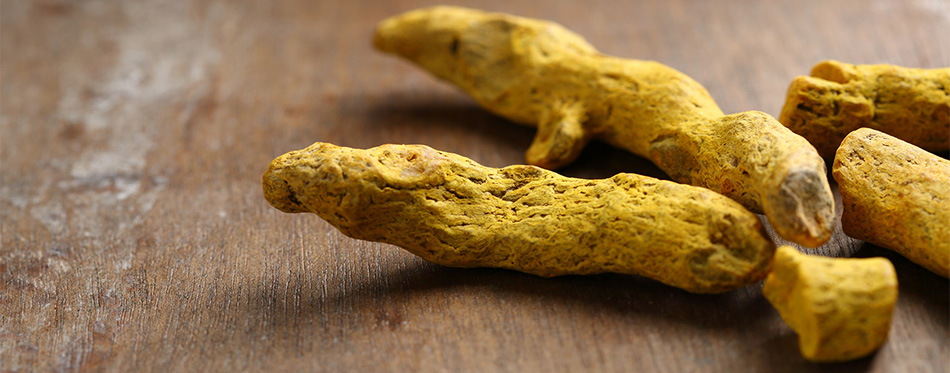Most of us know turmeric as a delicious tasting spice used to flavor curries, roasted vegetables, soups, rice and even tea, but did you know it’s also used as an herbal medicine? Although turmeric is most often found in kitchens across the world and is famous for its unique taste and food-coloring ability, it’s also famous for its ability to aid in the treatment and recovery of many health conditions. While this purpose is fairly well-known – with more than 6,000 studies carried out regarding its healing properties – it’s often neglected as a treatment for illnesses in pets. Instead, the healing powers of turmeric are more often used on humans rather than their canine companions despite it being just as beneficial for both.
In this article we’re going to cover what’s so special about turmeric, focusing on why and how it can be used to help treat medical ailments in dogs. We’ll also look at some of the many ways you can include turmeric into your dog’s diet, including the suggested dosage and the different forms of turmeric you can use. So, if you’re looking to find a new solution to your pup’s medical problems or if you’re simply curious about the many uses of turmeric for canine health, there’ll be something in here for you!

What Is (In) Turmeric?
Turmeric is a type of plant found in the ginger family which is used for several reasons. The main plant itself isn’t used, however, the root can be used whole, sliced, or turned into a powder or paste depending on what it is to be used for. As we all know, turmeric is a poplar spice and natural dying agent which is used all over the world for these purposes. However, turmeric has also been used as an herbal medicine for thousands of years – and it still is today! That’s because turmeric has an active ingredient called curcumin which has natural antifungal, antiviral, anti-inflammatory and antibacterial properties. This can be found in some non-herbal medicines or it can be used alone in various ways to treat severe illnesses or minor ailments.
Turmeric for Dogs Benefits
The list of benefits of turmeric for dogs is almost endless and with over 6,000 studies carried out, it’s certainly a popular and successful choice. The active compound, curcumin, is the reason for its usefulness as the chemical assists in the treatment and recovery of many minor and severe medical conditions. So, let’s take a look at some of the many ways that turmeric can help a poorly pup.
- Provides vitamins, fiber and minerals.
- Can alleviate joint and muscular pain.
- Assists with weigh management.
- Can improve mood and has been used to treat depression.
- Can kill external parasites.
These problems can be greatly improved by using turmeric as a natural remedy. Since these conditions can occur regularly and easily, using turmeric as a treatment can save a lot of time, money and effort as it might mean you won’t have to buy expensive drugs or visit the vet as frequently. However, you should first consult a vet before administering turmeric and follow specific instructions regarding dosage. Below is another list of the ways that turmeric can improve your pup’s health, particularly in relation to specific medical conditions.
Related Post: Dog Vitamins
- Improve heart health
Turmeric has been found to improve heart and general bodily health in patients with congestive heart failure. It works by thinning the blood and lowering bad cholesterol levels which reduces the chance of a blood clot and heart attacks.
- Antioxidant
It is widely believed that the degeneration of cells and aging effects on the body are caused by naturally occurring ‘free radicals.’ However, free radicals can also be caused by radiation, toxins, pollutants, and chemicals entering the body and the consumption of processed foods. Turmeric, or rather the active ingredient curcumin, is a natural antioxidant and can help to prevent aging effects and cell degeneration.
- Anti-inflammatory
Inflammation is a normal bodily response following exposure to bacteria, heat, toxins and other dangers. It is caused by the rapid release and gathering of white blood cells in the affected area. The rise in blood flow in that specific area is the cause of inflammation. While this is a perfectly normal response to any of the previously mentioned dangers, chronic inflammation is quite different and usually stems from another medical condition. Inflammatory Bowel Disease (IBD) is another condition which causes inflammation and digestion problems by disrupting normal bodily functions. This affects many people and animals all over the world and is regularly treated by medicine or natural remedies such as turmeric. Whether the cause of inflammation is known or not, it’s important to seek professional advice from the vet to keep your poorly pup safe. However, in the meantime, turmeric can be used to reduce the effects of inflammation. This can be particularly useful since turmeric is readily available in most stores (or already in your home), it’s cheaper than medication and works just as effectively. In fact, curcumin has even been proven to be more effective than aspirin and ibuprofen for its anti-inflammatory qualities.
- Pain relief
While turmeric is commonly used to relieve pain caused by arthritis, it is effective for reducing pain caused by almost any injury. If you have a poorly pup that is suffering from joint or muscular pain you could try providing them with some turmeric to relieve their pain. Curcumin has even been proven to be just as beneficial for treating knee osteoarthritis as ibuprofen and, in a recent study, it was preferred over ibuprofen as it removed some undesired side effects.
The previous medical issues are just some of the many conditions which are treated or prevented by turmeric. This natural remedy has the ability to treat many other conditions such as diabetes, arthritis, liver disease and cancer. While it has a reputation for being extremely effective (proven by scientific research), it’s important to always seek professional advice from a vet before administering any kind of medicine to your pet.

Turmeric for Dogs Recipe
Using turmeric for your dog isn’t as simple as feeding them the soft, yellow powder unfortunately. It also can’t be sprinkled onto your pup’s food either as turmeric isn’t absorbed into the body so easily. However, there are a few quick and easy ways to introduce turmeric into your doggy’s diet. Before we get started, it’s important to learn how to feed turmeric to your dog safely using the right dosage. Most vets will agree that 1/8 to 1/4 teaspoon per 10 pounds of bodyweight is sufficient per serving and can be give up to 3 times per day. If this dosage doesn’t seem to be working after 5 to 7 days, and if you’ve asked for medical advice, you can increase the dosage marginally. So, let’s take a look at how to add this miracle powder into your dog’s diet.
- Turmeric gravy
Making turmeric gravy is fast and simple. It simply involves mixing half a cup of boiling water with a tablespoon of turmeric powder to create a runny, gravy-like consistency. You can thicken or thin the gravy to your dog’s liking and add it to their food bowl when it’s cooled down. However, you might want to check that your dog enjoys the taste before pouring it all over their food.
- Turmeric paste
This paste can is similar to the gravy recipe but it must be heated in a pot or pan on a low to medium heat for 5 to 10 minutes. Stir the paste until it has reached the desired consistency, adding more powder or water for a thicker or thinner paste respectively. When the paste cools down you can feed it to you precious pup in little amounts or serve it with the food bowl. Store the remaining paste in Tupperware or an airtight jar in the refrigerator to keep fresh.
Some veterinarians recommend adding some black pepper or dog-friendly oil such as coconut, linseed or olive oil. These additions not only have antioxidant and antibacterial qualities, but they also improve the solubility of the paste or gravy. This will ensure the turmeric is absorbed efficiently by the body and will help to improve the results of this natural remedy.
Turmeric Capsules for Dogs
For some dogs and pet parents, homemade remedies might not be an option for a number of reasons. They might simply not work for your dog, maybe the ingredients are hard to find or you might not simply have the time to make the curcumin concoctions. Don’t worry, you’re not alone and there other options available for you and your precious pup. Turmeric capsules are a popular choice for many pet owners as they simplify the problem of finding the right dosage and can be used easily whenever you need them. No fussing around in the kitchen.
Turmeric capsules are usually comprised of turmeric powder with some dog-friendly oil and are available online and in many pet stores. Some capsules will have low levels of curcumin while others will have higher. Before purchasing turmeric capsules you should first check how much curcumin is safe for your dog. You should also ensure you are buying capsules from a reputable source. At first, try just one capsule per day and measure your dog’s response. If they seem to like it and it shows only positive signs or none, then you could try increasing the dosage. On average, a ½ capsule per 10 lbs of bodyweight is recommended for dogs under 20 lbs. Dogs that weigh between 20 to 100 lbs should be given 1 or 2 capsules, while dogs weighing over 100 lbs will most likely require the recommended dose for humans. These can be given up to 3 times per day and should not be exceeded. If too much turmeric (or curcumin) is administered there can be adverse effects so it’s best to stick with the recommended dosage and address any concerns with your local vet.
Side Effects of Turmeric
Too much curcumin can cause some medical problems in both dogs and humans. These side effects aren’t expected if the dosage is correct so it typically implies that too much curcumin has been consumed. They can usually be avoided by adhering to the recommended dosage and seeking professional medical advice from the vet before starting turmeric supplementation. Nevertheless, here are a few common side effects caused by a turmeric overdose.
- Upset stomach
Turmeric acts as binding agent which is very effective for treating diarrhea. However, if dogs are given too much and are already dehydrated this can cause stomach pain and may lead to constipation.
- Thin blood
As turmeric is a natural anti-inflammatory which works by thinning the blood, it is useful for treating inflammation and reducing the risk of a heart attack or stroke. If too much turmeric is administered or if a dog’s blood is already naturally thin yet still receives turmeric supplements, then blood problems may arise. This can cause difficulties when absorbing and using nutrients and can also lead to increased bruising. Thin blood can also lead to headaches and promote feelings of dizziness and nausea.
While most studies regarding the adverse effects of turmeric have been carried out on humans, it is widely believed that dogs can be affected by curcumin overdose in the same way. If you notice any of these symptoms then you should immediately reduce the amount or stop administering turmeric to your dog and inform the vet.

Final Thoughts
Turmeric for dogs has many benefits and can be added to your doggo’s diet in a number of ways. By adding a little bit of turmeric paste, gravy or supplements into your dog’s diet you can improve their health while preventing other medical conditions from arising. By speaking with your vet to determine the dosage and monitoring your precious pup’s reaction, you can be confident when introducing this miracle powder to you your pup. After this, you’ll have a healthy and happy pup. Who doesn’t want that?

